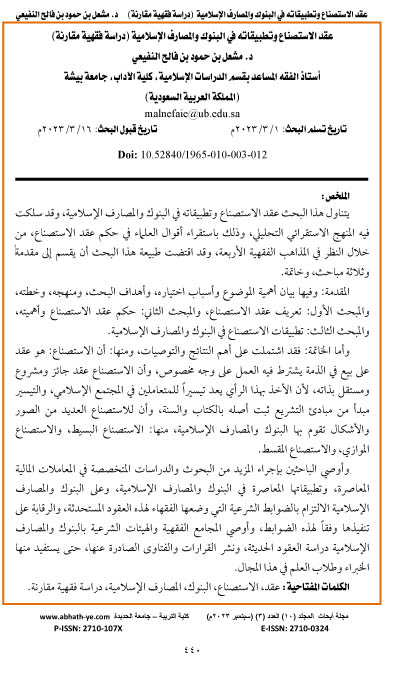Istisna'a Contract and its Applications in Islamic Banks A Comparative Jurisprudent Study
Keywords:
Contract, ., Istisna'a, Banks, Islamic Banks, Comparative Jurisprudent StudyAbstract
This research deals with the Istisna'a (manufacturing) contract and its applications in Islamic banks. I adopted the analytical inductive approach in it, by extrapolating the scholars' sayings in the ruling on the Istisna'a contract, by looking at the four doctrines of jurisprudence. The nature of this research required that it be divided into an introduction, three chapters, and a conclusion.
The introduction: It contains a statement of the importance of the subject and the reasons for its selection, the research objectives, its methodology, and its plan. The first chapter: the definition of the Istisna’a contract, the second chapter: the ruling on the Istisna’a contract and its importance, and the third chapter: the Istisna’a contract applications in Islamic banks.
As for the conclusion: it included the most important results and recommendations, including: that Istisna’a is a contract of sale in which it is required to work in a specific way, and that Istisna’a is a permissible, legitimate and independent contract in itself, because the adoption of this opinion is considered as facilitation for dealers in the Islamic community, and facilitation is a principle of the principles of legislation, whose origin is established in the Book and the Sunnah, and that Istisna’a has many forms and types carried out by Islamic banks, including: simple Istisna’a, parallel Istisna’a, and installment Istisna’a.
I recommend researchers to conduct more research and studies specialized in contemporary financial transactions, and their contemporary applications in Islamic banks. In addition, Islamic banks should adhere to the legal controls set by jurists for these new contracts, and monitor their implementation in accordance with these controls. Moreover, I recommend the jurisprudence academies and Sharia boards of Islamic banks to study modern contracts and the publication of decisions and fatwas issued for them, so that experts and students of knowledge in this field can benefit from them.

Downloads
Published
How to Cite
Issue
Section
License
Copyright (c) 2023 ِabhath Journal for the Humanities

This work is licensed under a Creative Commons Attribution 4.0 International License.
- البحوث المنشورة في المجلة مرخصة بموجب ترخيص (CC BY 4.0) Creative Commons Attribution 4.0 الدولي.
- تسمح المجلة بإعادة نسخ وتوزيع ونقل العمل لأي وسط أو شكل لأي غرض.
- تسمح بالتعديل والتحويل، والإضافة على العمل مع نسبة ذلك إلى المؤلف.
- حقوق النشر يحتفظ بها الباحثون.




